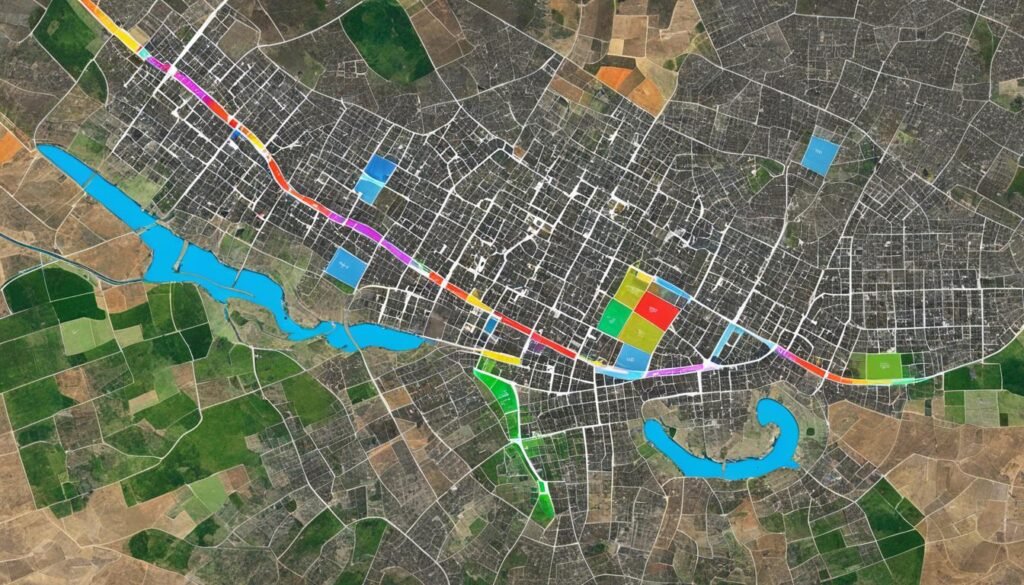Homelessness is a critical issue that has profound impacts on individuals and communities. It is important to understand the effects of homelessness and why addressing this crisis is crucial for society as a whole. Homelessness not only affects the individuals experiencing it but also has significant socioeconomic consequences. It is essential to explore the causes and consequences of homelessness, as well as potential solutions to prevent and alleviate this problem. In this article, we will dive into the data and research to gain a deeper understanding of the impacts of homelessness.
Key Takeaways:
- Homelessness has profound impacts on individuals and communities.
- Addressing homelessness is crucial for society as a whole.
- Homelessness has significant socioeconomic consequences.
- Understanding the causes and consequences of homelessness is essential.
- Potential solutions can prevent and alleviate homelessness.
The Impact of Homelessness on Mental Health
Homelessness has a profound impact on mental health, with devastating effects on individuals experiencing homelessness. The stress, trauma, and instability associated with homelessness contribute to the development or worsening of mental health conditions. Recent statistics reveal alarming rates of mental illness among the homeless population. Many individuals struggle with conditions such as depression, anxiety, post-traumatic stress disorder (PTSD), and substance use disorders.
The harsh realities of homelessness, such as sleeping on the streets, lack of basic necessities, and social isolation, can exacerbate existing mental health issues and trigger new ones. Without stable housing and access to essential support services, homeless individuals face significant challenges in managing their mental well-being.
The effects of homelessness on mental health are far-reaching and contribute to a cycle of despair for many individuals. Homelessness compounds the already complex nature of mental illness, making it difficult to receive adequate treatment and support. Additionally, the stigma surrounding homelessness further isolates individuals, preventing them from seeking the help they desperately need.
Designing effective interventions and support systems for homeless individuals requires a thorough understanding of the impact of homelessness on mental health. By addressing the mental health needs of those experiencing homelessness, we can improve their overall well-being and increase their chances of successfully transitioning out of homelessness.

Note: The image above portrays the impact of homelessness on mental health. The image brings attention to the emotional struggles faced by homeless individuals, highlighting the importance of recognizing and addressing their mental health needs.
Statistics on Homelessness and Mental Health
- According to a study conducted by the National Alliance to End Homelessness, approximately 25% of people experiencing homelessness have a serious mental illness.
- The Substance Abuse and Mental Health Services Administration (SAMHSA) reported that around 45% of homeless individuals have a mental health condition.
- Research from the Treatment Advocacy Center shows that individuals with untreated mental illness are more likely to experience homelessness.
- People experiencing homelessness have higher rates of psychiatric hospitalizations and emergency room visits compared to the general population.
These statistics underscore the urgent need to prioritize mental health support for individuals facing homelessness. By addressing the mental health challenges associated with homelessness, we can provide a crucial stepping stone towards stability, recovery, and a brighter future for those in need.
The Socioeconomic Effects of Homelessness
Homelessness has wide-ranging socioeconomic effects on both the individuals experiencing homelessness and the communities they reside in. Studies have shown that the impacts of homelessness go beyond just housing instability.
One of the primary socioeconomic effects is the decrease in employment rates among homeless individuals. The lack of stable housing and resources makes it challenging for them to gain and maintain employment. Limited access to job opportunities and support services further exacerbate this issue.
Moreover, homelessness often leads to decreased educational attainment. Individuals experiencing homelessness face numerous barriers to education, including a lack of consistent schooling, limited access to resources and educational materials, and the overall instability that accompanies homelessness.
The impacts of homelessness extend beyond the individuals themselves to the communities they reside in. Homelessness places a significant strain on public resources and services. Communities with a high homeless population experience increased demand for emergency shelters, healthcare services, and other public support systems. This puts pressure on local economies and diverts resources that could be used for other essential programs.

Impacts of Homelessness:
- Lower employment rates
- Decreased educational attainment
- Increased reliance on public services
- Strain on local economies
- Diversion of resources from other programs
Addressing the socioeconomic effects of homelessness requires a multi-faceted approach. It involves providing stable housing options, access to education and employment opportunities, and supportive services to help individuals overcome the barriers they face.
Next, we will explore the mental health impacts of homelessness and the importance of addressing these challenges for homeless individuals.
Addressing Homelessness: Policies and Solutions
Tackling homelessness requires comprehensive policies and solutions. To effectively address homelessness, it is essential to focus on homelessness prevention, housing instability, homelessness solutions, and homelessness policy in California.
Homelessness Prevention
Preventing homelessness through early intervention programs and targeted support is key in mitigating its impacts. By identifying individuals and families at risk of homelessness and providing preventive measures such as financial assistance, mediation services, and employment support, we can help them maintain stable housing.
Addressing Housing Instability
The lack of affordable housing is a significant contributor to homelessness. To combat this issue, it is crucial to invest in affordable housing initiatives, increase the availability of subsidized housing options, and implement policies that protect renters from eviction and housing discrimination.
Homelessness Solutions
Homelessness solutions should focus on providing comprehensive support to individuals and families experiencing homelessness. This includes access to healthcare, mental health services, substance abuse treatment, and case management. It is essential to provide temporary shelter and transitional housing for those in immediate need while working towards long-term housing stability.
Homelessness Policy in California
California faces unique challenges when it comes to homelessness due to high housing costs, a lack of affordable housing, and other contributing factors. To address homelessness in California, a collaborative approach involving government agencies, community organizations, and stakeholders is crucial. Policies should prioritize funding for affordable housing initiatives, support programs for homeless individuals with mental health and substance abuse issues, and job training programs to help individuals gain economic stability.
By implementing effective policies and solutions that prevent homelessness, address housing instability, and provide comprehensive support, we can make significant progress in combatting homelessness and creating a more equitable society.

The Economic Impact of Homelessness
When it comes to homelessness, the effects are not just limited to the individuals experiencing it. The economic impact of homelessness is far-reaching and has implications for communities and society as a whole. Understanding how the economy affects homelessness and the impact it has is crucial for policymakers and stakeholders in order to effectively allocate resources and implement solutions.
One significant cost of homelessness is the increase in healthcare expenses. Homeless individuals often face greater health challenges, including higher rates of chronic illness and mental health issues. This leads to increased utilization of healthcare services, putting a strain on public healthcare systems and driving up costs.
Emergency shelter operations also contribute to the economic burden of homelessness. The need for temporary shelters and emergency accommodations arises to provide a basic level of safety and protection for those without homes. These operations require funding that could be used in other areas, further stretching limited resources.
Furthermore, homelessness has an impact on productivity and economic output in communities. Homeless individuals face numerous barriers to stable employment, such as limited access to resources and job opportunities. This can result in a decrease in productivity and potential economic growth, as a significant portion of the population is unable to actively contribute to the workforce.
By comprehending the economic impact of homelessness, policymakers and stakeholders can make informed decisions on resource allocation and implement strategies that address the root causes of homelessness. By investing in preventative measures, affordable housing initiatives, and support services, we can effectively reduce the economic burden of homelessness and improve the overall well-being of individuals and communities.
- Increased healthcare expenses
- Emergency shelter operations
- Decreased productivity and economic output
To tackle the economic impact of homelessness, collaboration between government agencies, community organizations, and stakeholders is essential. By working together, we can develop sustainable solutions that address the underlying factors contributing to homelessness and create a society where everyone has access to safe and stable housing.
Homelessness in California: Causes and Solutions
California has been severely impacted by the homelessness crisis, with a significant number of people experiencing homelessness in cities like Los Angeles and San Francisco. The causes of homelessness in California are multifaceted and complex. High housing costs and a lack of affordable housing options make it difficult for individuals and families to secure stable housing. Additionally, mental health issues and substance abuse can contribute to homelessness in the state.
To address homelessness in California, a comprehensive approach is necessary. Expanding affordable housing options is crucial to providing individuals and families with stable housing. This can be achieved through the development of more affordable housing units and the implementation of rent control policies. Increasing access to mental health and substance abuse treatment services is also essential in addressing the underlying issues that contribute to homelessness.
Supportive services play a vital role in helping individuals transition out of homelessness and regain independence. These services may include job training and placement programs, financial assistance, and case management support. By providing individuals with the necessary resources and support, we can empower them to overcome homelessness and rebuild their lives.
Conclusion
Homelessness has a profound impact on society, affecting the lives of both individuals and communities. It poses significant challenges to mental health, socioeconomic status, and overall well-being. Understanding the causes and consequences of homelessness is crucial in addressing this complex issue effectively.
To combat homelessness, it is imperative to implement evidence-based policies and solutions. By providing support to homeless individuals and families, we can alleviate their suffering and work towards ending homelessness. This includes expanding affordable housing options, increasing access to mental health services and substance abuse treatment, and offering supportive services to aid in the transition out of homelessness.
It is essential for individuals, communities, and policymakers to come together in a collaborative effort to find sustainable solutions. By addressing the impacts of homelessness, investing in homeless families and individuals, and advocating for policy changes, we can create a more equitable society for all. Together, we can make a difference and provide the support and resources needed to help those experiencing homelessness rebuild their lives.
FAQ
What are the effects of homelessness on society?
Homelessness has profound socioeconomic consequences, leading to lower employment rates, decreased educational attainment, and increased reliance on public services. It also puts strain on local economies and community well-being.
How does homelessness impact mental health?
Homelessness takes a toll on mental health, with individuals experiencing higher rates of mental illness compared to the general population. The stress, trauma, and instability associated with homelessness contribute to the development or worsening of mental health conditions.
What policies and solutions can address homelessness?
Effective homelessness policies and solutions should focus on prevention through early intervention, addressing housing instability and affordability, providing access to healthcare and mental health services, and creating employment opportunities. Collaboration between government agencies, community organizations, and stakeholders is vital for success.
What is the economic impact of homelessness?
Homelessness has economic implications, including increased healthcare expenses, emergency shelter operations, and decreased productivity in communities. Understanding the economic impact is crucial for allocating resources effectively and implementing solutions.
What causes homelessness in California?
Homelessness in California is influenced by factors such as high housing costs, lack of affordable housing, mental health issues, and substance abuse.
How can homelessness in California be solved?
Solving homelessness in California requires a multi-faceted approach: expanding affordable housing options, increasing access to mental health and substance abuse treatment, and implementing supportive services to help individuals transition out of homelessness.
What can be done about homelessness?
To address homelessness, we need to understand its causes and consequences, implement evidence-based policies, provide support to homeless individuals and families, and foster collaboration between individuals, communities, and policymakers.







